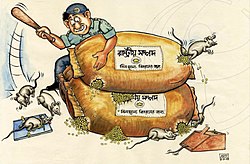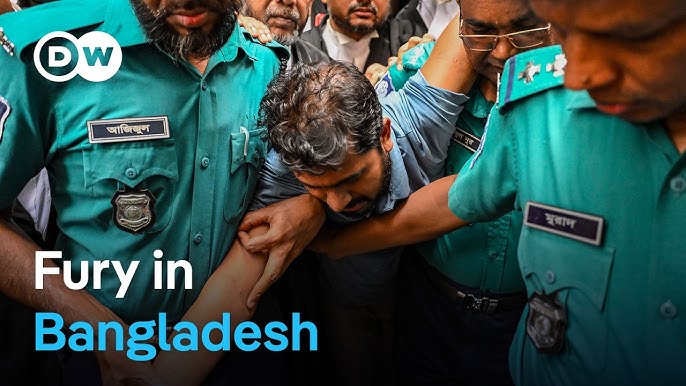Recently, an incident in Jhalakathi has caused widespread sensation among the public. Two students from Barisal University were detained while attempting to collect a bill for a project worth 3 crore Taka. This incident has sparked discussions not only within the local administration but also in political circles. In this blog post, we will analyze the details of this incident, investigate the reasons behind it, and discuss its potential implications.
The Genesis of the Incident: Tension Over Bill Collection
The incident began when Sirajul Islam (24), the former member secretary of the Anti-Discrimination Student Movement of Barisal University, and Mehedi (25), a student of Barisal Global University, went to the Jhalakathi LGED (Local Government Engineering Department) office to secure the final payment for a 3 crore Taka bridge and road project. This project is reportedly associated with Shawon Khan, the computer operator for former Jhalakathi-2 constituency MP Amir Hossain Amu. A heated argument ensued with pro-BNP contractors present at the LGED office regarding the bill collection, which eventually escalated into a scuffle.

Police Intervention and Detention
Upon receiving news of the tension, the police quickly arrived at the scene and brought the situation under control. Sirajul Islam and Mehedi were detained and taken to the Sadar Police Station. The news of their detention spread rapidly, and leaders from various political parties gathered at the police station. Mizanur Rahman Mubin, a member of the Jhalakathi District BNP convening committee; Saiful Islam, Joint General Secretary of the Barisal District Jatiya Nagorik Party; Tushar Khan, an organizer for the Barisal Metropolitan committee; and local political leaders were present at the station.
Release on Personal Undertaking: A Picture of Compromise
While in police custody, the two students admitted that their presence at the LGED office was a mistake. Due to the absence of a written complaint from the LGED authorities, and through the mediation of local political leaders, they were released after signing a personal undertaking (muchleka). Several members from the NCP, the Anti-Discrimination Student Organization, BNP, and Jubo Dal were present during the signing of this undertaking in the Officer-in-Charge (OC) Moniruzzaman’s room. Later, in a joint statement to journalists in front of the police station, they stated that there had been a misunderstanding, which was resolved in the presence of senior leaders.
Allegations and Counter-Allegations: A Shadow of Corruption?
Allegations of corruption have also emerged behind this incident. Nalchity Upazila Engineer Iqbal Kabir alleged that for the past two months, Sirajul Islam and Mehedi had been pressuring him to release the 3 crore Taka bill for Shawon Khan. He further alleged that they had offered him a bribe to release the bill. The engineer stated that because he refused the bribe, they filed complaints of irregularities against him in various departments. Finally, on Thursday at 2 PM, they demanded an explanation from the Jhalakathi LGED Executive Engineer for not paying the bill. This created tension, and the pro-BNP contractors present there detained the two coordinators for coming to release the bill of Amir Hossain Amu’s staff, Shawon, and handed them over to the police.
On the other hand, the detained students told reporters that they had gone to inform the Executive Engineer about the bribery and corruption of Nalchity Upazila Engineer Iqbal Kabir. But the contractors present created a mob and had them arrested by the police.
Identities of Those Involved
Sirajul Islam is the son of Nurul Bashar, a fruit trader from Dogolchira village in Jhalakathi Sadar Upazila’s Nabagram Union. Mehedi is the son of Kalam, a grocery store owner from Kakoli’s More in Barisal city.

Police Statement
Jhalakathi Sadar Police Station OC Moniruzzaman stated that upon receiving news that two coordinators of the Anti-Discrimination Student Movement were detained by local contractors at LGED, he sent the police and brought them to the station for their safety. The LGED authorities informed them that they were being unethically harassed. On the day of the incident, they went to the Executive Engineer’s office to collect an incomplete bill. Since there was no written complaint against them and local political leaders mediated and resolved the issue, they were released.
Nalchity Upazila Engineer’s Statement
Nalchity Upazila Engineer Iqbal Kabir further stated that the two coordinators from Barisal came to get a final bill of 3 crore Taka released on behalf of Amir Hossain Amu’s staff, Shawon. Since the work was not completed and the bill was not processed through the proper procedure, he asked them to bring the actual contractor. But instead of bringing the contractor, they repeatedly came with some other youths and applied pressure. He informed his superiors, the Nalchity Upazila Nirbahi Officer (UNO), journalists, and local student leaders of Chhatra Dal and the student coordinators about the matter. The engineer questioned how he could release a bill without the contractor. At one point, they even offered him a bribe to release the bill. When he refused, they started harassing him by filing complaints in different departments. He stated that he would take further action after consulting with his superiors.
Analysis and Relevance of the Incident
This incident clearly illustrates corruption and abuse of power within Bangladesh’s administrative system. The involvement of students in collecting a government project bill and the emergence of politically influential names raise questions about overall good governance in the country. Specifically, the attempt to collect a 3 crore Taka project bill in the name of a former MP’s computer operator and the accompanying bribery allegations create suspicion among the general public regarding the transparency of government work.
This incident once again proves how deeply rooted corruption is at various levels of the country. When students, who are the future of society, get involved in such unethical activities, it negatively impacts the country’s education system and morality. Such incidents can mislead the younger generation and increase their tendency to earn money quickly.
Legal and Ethical Aspects
From a legal perspective, offering bribes and obstructing government work are both serious offenses. Although in this case, the detainees were released on personal undertaking due to the absence of a written complaint, it is questionable how effective this will be in preventing the recurrence of such incidents in the future. Ethically, this incident is also an ominous sign for society. When influential individuals use their power to gain unethical advantages, it weakens the rule of law and erodes public trust.
Public Impact and Future Consequences
This incident will have a significant impact on public perception. The general public will become more skeptical about the effectiveness of government offices and the role of politically influential individuals. Such incidents also raise questions about the government’s zero-tolerance policy against corruption. If such incidents are not properly investigated and the culprits are not exemplary punished, many others will be encouraged to engage in similar unethical activities in the future.
Conclusion
Although this incident in Jhalakathi may seem isolated, it is a reflection of Bangladesh’s broader social and administrative problems. A thorough investigation of this incident and strict action against those involved are crucial. At the same time, instilling ethical education in the country’s education system and fostering values of honesty and integrity among the younger generation are extremely important. Only then can we establish a corruption-free and well-governed society. Learning from such incidents, attention should be paid to ensure that such situations do not arise in the future.

https://t.me/s/Official_1win_kanal/1791
https://t.me/s/Webs_1WIN
https://t.me/s/Officiall_Telegram_1win
https://t.me/Martin_officials
https://t.me/s/reJtINGTopkaZInO
188v com không chỉ là nơi giải trí mà còn là đối tác tin cậy, giúp quý khách hiện thực hóa những kỳ vọng về tài chính. Hãy truy cập trang đại lý chính thức để nhận link vào an toàn và bắt đầu hành trình chinh phục những đỉnh cao mới. TONY12-30
Chỉ sau thời gian ngắn ra mắt, tải 888slot đã nhanh chóng khẳng định vị thế tại thị trường quốc tế với sự hiện diện tại hơn 20 quốc gia, nổi bật tại châu Á như Việt Nam, Thái Lan, Nhật Bản và đang mở rộng sang châu Âu. TONY12-30
188V mang đến trải nghiệm cá nhân hóa sâu sắc, ghi nhớ sở thích người dùng để đề xuất những kèo cược thơm nhất mỗi ngày. (Tương tự cho đến đoạn 80, tập trung vào: app, mượt mà, dễ dùng) TONY01-26
deegarciaradio.com trở thành địa điểm giải trí trực tuyến hàng đầu của rất nhiều hội viên trong giới cá cược online bởi mang lại thế giới săn thưởng sự mới mẻ, đặc sắc. Trang Nhà Cái 188v.com Anh em khi tham gia sẽ được trải nghiệm từng cung bậc cảm xúc khác nhau. TONY01-30H
Để đảm bảo an toàn tối đa cho giao dịch, 66b slot áp dụng công nghệ mã hóa SSL 256-bit cùng hệ thống xác thực hai lớp (2FA) tùy chọn. Mỗi giao dịch đều được ghi nhận với mã tham chiếu duy nhất, giúp dễ dàng theo dõi và giải quyết vấn đề nếu có. TONY01-30H
888slot con tự hào sở hữu danh mục trò chơi độc quyền, mang đậm dấu ấn cá nhân hóa, giúp người chơi tìm thấy sự khác biệt so với các nền tảng thông thường. TONY02-03